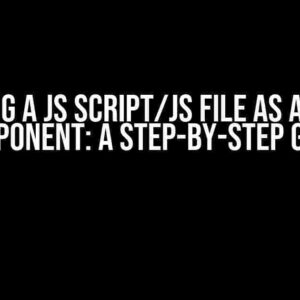Introduction
ReactFX is a powerful library that allows developers to create reactive applications with ease. However, many developers have encountered an issue when trying to declare ReactFX as a dependency in their projects. This article aims to provide a comprehensive guide on how to resolve this issue, ensuring that you can successfully integrate ReactFX into your project.
The Problem
When trying to declare ReactFX as a dependency, you may encounter the following error:
Failed to resolve: org/reactfx/reactfx:1.5.0
This error occurs because the ReactFX library is not properly linked to your project. In this article, we will explore the possible causes of this issue and provide step-by-step instructions on how to resolve it.
Cause 1: Missing Dependency Declaration
One of the most common causes of this issue is the missing dependency declaration in your project’s build configuration file.
Solution
To resolve this issue, you need to add the ReactFX dependency to your project’s build configuration file.
#### Maven
If you’re using Maven, add the following dependency to your `pom.xml` file:
<dependency>
<groupId>org.reactfx</groupId>
<artifactId>reactfx</artifactId>
<version>1.5.0</version>
</dependency>
#### Gradle
If you’re using Gradle, add the following dependency to your `build.gradle` file:
dependencies {
implementation 'org.reactfx:reactfx:1.5.0'
}
Cause 2: Incorrect Version
Another possible cause of this issue is using an incorrect version of ReactFX.
Solution
To resolve this issue, you need to ensure that you’re using the correct version of ReactFX.
#### Check the ReactFX Version
Check the ReactFX version in your project’s build configuration file. Make sure that you’re using the latest version of ReactFX.
<dependency>
<groupId>org.reactfx</groupId>
<artifactId>reactfx</artifactId>
<version>2.0.0</version>
</dependency>
#### Update the ReactFX Version
If you’re using an outdated version of ReactFX, update it to the latest version.
dependencies {
implementation 'org.reactfx:reactfx:2.0.0'
}
Cause 3: Missing Repository
Another possible cause of this issue is the missing repository declaration in your project’s build configuration file.
Solution
To resolve this issue, you need to add the ReactFX repository to your project’s build configuration file.
#### Maven
If you’re using Maven, add the following repository to your `pom.xml` file:
<repositories>
<repository>
<id>maven-central</id>
<url>https://repo.maven.apache.org/maven2/</url>
</repository>
<repository>
<id>jcenter</id>
<url>https://jcenter.bintray.com/</url>
</repository>
</repositories>
#### Gradle
If you’re using Gradle, add the following repository to your `build.gradle` file:
repositories {
mavenCentral()
jcenter()
}
Troubleshooting
If you’ve tried the above solutions and still encounter the issue, try the following troubleshooting steps:
#### Step 1: Clean and Rebuild
Clean and rebuild your project to ensure that the dependencies are properly resolved.
mvn clean package
#### Step 2: Check the Dependency Tree
Check the dependency tree to ensure that ReactFX is properly declared.
mvn dependency:tree
#### Step 3: Check the Repository
Check the repository to ensure that ReactFX is available.
mvn repository:list
Conclusion
In conclusion, declaring ReactFX as a dependency can be a challenging task, but by following the steps outlined in this article, you should be able to resolve the issue. Remember to check the dependency declaration, version, and repository to ensure that ReactFX is properly linked to your project. If you encounter any further issues, try the troubleshooting steps outlined above.
Best Practices
To avoid encountering this issue in the future, follow these best practices:
- Always declare the correct version of ReactFX in your project’s build configuration file.
- Ensure that the ReactFX repository is properly declared in your project’s build configuration file.
- Regularly clean and rebuild your project to ensure that the dependencies are properly resolved.
- Check the dependency tree and repository to ensure that ReactFX is properly declared and available.
By following these best practices and the steps outlined in this article, you should be able to successfully declare ReactFX as a dependency and integrate it into your project.
Frequently Asked Question
Stuck with declaring ReactFX as a dependency? We’ve got you covered!
Why can’t I declare ReactFX as a dependency in my Maven project?
Make sure you’ve added the correct repository to your Maven project. You can do this by adding the following code to your pom.xml: <repository><id>reactfx</id><url>https://oss.sonatype.org/content/repositories/snapshots/</url></repository>. Then, you can declare the dependency as usual.
I’m using Gradle, how do I declare ReactFX as a dependency?
No problem! In your build.gradle file, add the following code: repositories { maven { url 'https://oss.sonatype.org/content/repositories/snapshots/' } } and then declare the dependency as implementation 'org.reactfx:reactfx:2.0-M5'. Replace the version number with the one you need.
What if I’m using a newer version of ReactFX?
Easy peasy! If you’re using a newer version of ReactFX, you might not need to add the snapshot repository. Just declare the dependency as usual, and make sure you’ve updated your Maven or Gradle configuration to use the correct version.
I’m getting a conflict with another dependency, what do I do?
Bummer! In this case, try excluding the conflicting transitive dependency. For example, if you’re using Maven, you can add the following code to your dependency declaration: <exclusions><exclusion><groupId>conflicting.group.id</groupId><artifactId>conflicting.artifact.id</artifactId></exclusion></exclusions>. Replace the group and artifact IDs with the actual values.
Where can I find more information about ReactFX?
Head over to the ReactFX GitHub page or the official documentation for more information, tutorials, and examples. You can also search for ReactFX communities and forums where you can ask for help and get feedback from other developers.





